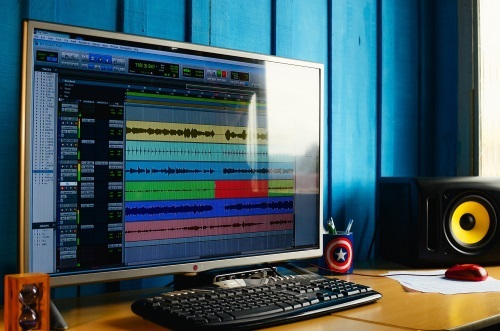
Misconception 3: All recording engineers have the tools and knowledge to master a project.
As the description above states, mastering engineers possess very specific skills and gear. Most reputable mastering engineers do nothing but master, and I, for one, would never dream of having my project mastered by anyone who did not specialize in mastering only.
As far as gear goes, I’ve been in several mastering facilities where I haven’t recognized one single piece of gear or found any of the tools common to just about any recording studio.
I once read a post on an audio engineering board that stated that the BBE Sonic Maximizer was the “secret weapon” of mastering houses.
Now, I’m not saying that particular poster did not see that box in what he was told was a mastering house, but in the professional facilities I’ve seen, the only function it would serve is as a drink coaster.
Misconception 4: There is software on the market that can accomplish what a mastering engineer in a mastering facility can do.
Nope! That’s like saying that everyone with a DAW can produce commercial recordings.
Now, can you buy software that enhances your project studio’s recordings? Of course. Should you experiment with all sorts of hardware and software tools to get the best out of your rig—absolutely! Can you get $50 of software to do what years of experience and custom hardware in the hands of a pro can do—not without skill and talent.
Misconception 5: All mastering facilities/mastering engineers are created equally.
Nope. Go to 10 different mix engineers, get 10 different mixes, and the same goes for mastering engineers and facilities. Just because some people have had bad mastering experiences, don’t assume that you’d be better off doing it yourself.
The same also goes with good mastering experiences. Every project is different and has it’s own set of challenges.
Misconception 6: All recording projects must be mastered.
Simply put, this is not true. It all depends upon the purpose of the recording. If your final (un-mastered) mixes sound good to you, and you want to release them, then more power to you!
I’ve produced and heard plenty of songwriter demos, indie EPs, short run releases, and project recordings that would not have been cost effective for the artists to have them professionally mastered, and would have served little purpose for the intended use of the recordings.
Misconception 7: Louder = Better
Read this great article by Rip Rowan about the atrocities of the loudness wars.
I will summarize by saying that a recording can be ruined by a substandard mastering job, and that record labels and artists (and even some mastering engineers) seem to think that louder is somehow better. And it can ruin the dynamic aspects of otherwise great recordings.
Now, go record some great music!
